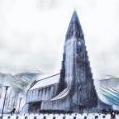For ease of reference, I thought I would paste what Wikipedia says about musical eclecticism here:
In music theory and music criticism, eclecticism refers to the use of diverse styles, either distinct from the background of an artist using them, or from culturally bygone eras and movements. The term can be used to describe the music of composers who combine multiple styles of composition; an example would be a composer using a whole tone scale variant of a folk song in a pentatonic scale over a chromatic counterpoint, or a tertian arpeggiating melody over quartal or secundal harmonies. Eclecticism can also occur through quotations, whether of a style, direct quotations of folk songs/variations of them—for example, in Mahler's Symphony No. 1—or direct quotations of other composers, for example in Berio's Sinfonia.
Unfortunately, I can't speak much to the issue personally, as my involvement in the academic music setting is auxiliary at best. From my limited experience, it does seem that care is taken to expose students to various schools of musical thought. I've been to several local concerts featuring the music of university students... some of them are heavily influenced by popular music, some are largely experimental (all that extended technique stuff), none of them are serialist, and very few of them are good. But this is a public university, not a conservatory, and I'm sure its mindset of "anyone can make music" waters down the end product.
I don't think it's worthwhile to describe modern "classical" music as inherently good or bad... it simply is. And what it has become is staggeringly complex; this eclecticism has produced a vast array of styles and expression, and there is surely something for everyone out there. For example, I love the sound of quartal harmonies. I'm quite hard-pressed to find any such music before the early 20th century. On the contrary, admirers of tertian harmony might find the music of the 20th century much to their disliking. However, nowadays classical music has become a glove that fits most. I can find modern composers who use exclusively quartal harmonies, as well as those who use tertian harmonies (perhaps even in a Neoclassical or Neobaroque style).
Time will tell whether this eclecticism is to our craft's benefit or detriment.



